|
|
|
Sort Order |
|
|
|
Items / Page
|
|
|
|
|
|
|
| Srl | Item |
| 1 |
ID:
123972
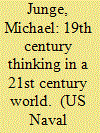

|
|
|
|
|
| Publication |
2012.
|
| Summary/Abstract |
Over the past decade the navy has changed dramatically. It has increased operations: decreased its number of ships; merged and created staffs and communities; responded to the 12 October 2000 bombing of the USS Cole-DDG-67 and 9/11; and deployed "Dirt Sailors" to fight inland battles in Iraq and Afghanistan. Meanwhile, the navy staff (OPNAV) has remained static, which one exception, the steady rise and fall of the Deputy Chief of Naval Operations Communication Networks Directorate or N6.
|
|
|
|
|
|
|
|
|
|
|
|
|
|
|
|
| 2 |
ID:
084338


|
|
|
|
|
| Publication |
2008.
|
| Summary/Abstract |
Can Kabul be saved? More troops are on the way, but a one-size-fits-all surge is not enough. We also need to change our tactics. If Washington wants to prevail in Afghanistan, we need to learn from successes in Iraq, and focus on fighting a war-not building a nation.
|
|
|
|
|
|
|
|
|
|
|
|
|
|
|
|
| 3 |
ID:
193065


|
|
|
|
|
| Summary/Abstract |
The two decades of war in Afghanistan left a mark on the American armed forces and redefined the American ways of war-making. One of this war’s legacies is the reimagining of the role of private military and security contractors in contemporary warfare. Due to the massive involvement of the private sector in the American war machine, this industry transformed from a marginal participant into a central partner. The privatization of military and security functions became a norm, an integral part of security architecture and military operation. In this study, I provide a brief review of this development and its implications.
|
|
|
|
|
|
|
|
|
|
|
|
|
|
|
|
| 4 |
ID:
193067
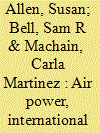

|
|
|
|
|
| Summary/Abstract |
Can the presence of international organizations reduce civilian deaths caused by aerial bombing? This commentary examines this question in the specific context of the U.S.-led war in Afghanistan. We evaluate this based on interviews conducted with members of international organizations that were present in Afghanistan during the conflict, existing intergovernmental organizations, nongovernmental organizations, and government reports, and with quantitative data on civilian casualties between 2008 and 2013. We conclude that there is tentative evidence from Afghanistan that international organizations can in fact reduce the severity of civilian killings that result from the use of air power. However, there is much need for greater data sharing to more fully answer this important question.
|
|
|
|
|
|
|
|
|
|
|
|
|
|
|
|
| 5 |
ID:
130871
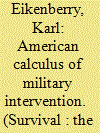

|
|
|
|
|
| Publication |
2014.
|
| Summary/Abstract |
The protracted campaigns in Afghanistan and Iraq have diminished America's appetite for waging wars to end tyranny or internal disorder in foreign lands. Military interventions have traditionally been a source of controversy in the United States. But America's appetite for the dispatch of armed forces has been diminished greatly by factors that have primarily emerged in the twenty-first century. These include, most painfully, the protracted campaigns in Afghanistan and Iraq that have made US political and military leaders more cautious about waging wars to end tyranny or internal disorder in foreign lands.
|
|
|
|
|
|
|
|
|
|
|
|
|
|
|
|
| 6 |
ID:
082317
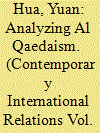

|
|
|
| 7 |
ID:
193056
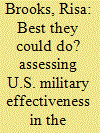

|
|
|
|
|
| Summary/Abstract |
This article explores shortcomings in military effectiveness in the war in Afghanistan. It focuses on three sets of problems: the failure to resolve internal contradictions in the training effort, the failure to integrate political considerations with military activity, and poor strategic and operational/tactical integration.
|
|
|
|
|
|
|
|
|
|
|
|
|
|
|
|
| 8 |
ID:
101247
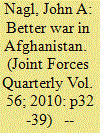

|
|
|
| 9 |
ID:
131466
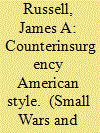

|
|
|
|
|
| Publication |
2014.
|
| Summary/Abstract |
This article examines the complex legacy of David Petraeus who was a key figure in the emergence of the US military shift towards counterinsurgency doctrine in the years after 2006. Although Petraeus has been perceived by critics as a publicity seeker, he can be credited with laying the foundations for a more serious commitment to COIN involving in particular in integrating conventional and Special Forces in arenas like village stability operations. The article looks a Petraeus's role in both Iraq and Afghanistan: it concludes that, in the case of Afghanistan, it is too early to assess whether counterinsurgency has had a decisive impact of the outcome of the war against the Taliban.
|
|
|
|
|
|
|
|
|
|
|
|
|
|
|
|
| 10 |
ID:
132723
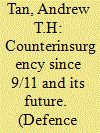

|
|
|
|
|
| Publication |
2014.
|
| Summary/Abstract |
Recent US experience in Iraq and Afghanistan has proven that COIN, however revised and updated to fit the globalised era in which we live, is a problematic and ineffective solution to the irregular warfare waged by insurgents. The United States and the West in general will have to accept the chastening lessons of Iraq and Afghanistan lest they repeat it: that they are not good at waging COIN and must try to avoid getting involved in such costly campaigns again. If intervention abroad has to be undertaken, it will have to fulfill a set of demanding conditions. Nonetheless, while COIN in its contemporary guise has failed to deliver long-term, tangible results, thinking about how to counter asymmetric challenges, including the waging of irregular warfare, cannot be ignored, given the likelihood that external interventions will continue to be required in the future. Moreover, while COIN as the basis of a grand strategy is unrealistic, some of its basic principles are useful in orientating future approaches to insurgencies and terrorism towards comprehensive and collaborative approaches, as opposed to merely hard security operations unilaterally undertaken by States, which fail to address the underlying fundamental causes of political violence and which undermine long-term legitimacy
|
|
|
|
|
|
|
|
|
|
|
|
|
|
|
|
| 11 |
ID:
060800
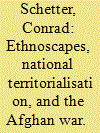

|
|
|
|
|
| Publication |
2005.
|
| Summary/Abstract |
This article pursues the question of how the territorialisation of power in the establishment of the Afghan nation-state has affected the spatial perceptions of political actors and the population at large. This question is particularly topical as spatial references are at present the driving force behind an ethnicisation of politics in Afghanistan. These perceived ethnic spaces, so-called ethnoscapes, not only compete with one another, but also contradict Afghanistan itself as a national territory. Thus since the outbreak of the Afghan war 1979 various political actors have been attempting to mobilise their constituencies over ethnic issues in order to use references to the spatial origins and expansion of their ethnic category to legitimise political claims. The principal argument of this article is that the population’s strong identification with the national territory of Afghanistan has to date prevented an ethnicisation of the masses in the Afghan conflict. Furthermore the article argues that the irreconcilability of the various perceived ethnic territories is an obstacle to the currently much-discussed establishment of ethno-federalism.
|
|
|
|
|
|
|
|
|
|
|
|
|
|
|
|
| 12 |
ID:
133631
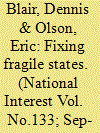

|
|
|
|
|
| Publication |
2014.
|
| Summary/Abstract |
America's cumbersome approach to interagency operations in the field urgently needs reform, centered around more powerful ambassadors and coordinated in-country policy design.
SINCE THE 9/11 attacks, the United States has waged major postwar reconstruction campaigns in Iraq and Afghanistan and similar but smaller programs in other countries that harbor Al Qaeda affiliates. Continued complex political, economic and military operations will be needed for many years to deal with the continuing threat from Al Qaeda and its associated organizations, much of it stemming from fragile states with weak institutions, high rates of poverty and deep ethnic, religious or tribal divisions. Despite thirteen years of experience-and innumerable opportunities to learn lessons from both successes and mistakes-there have been few significant changes in our cumbersome, inefficient and ineffective approach to interagency operations in the field.
|
|
|
|
|
|
|
|
|
|
|
|
|
|
|
|
| 13 |
ID:
160875
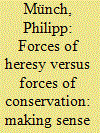

|
|
|
|
|
| Summary/Abstract |
Ethnicity and ideology are frequently used to determine whether an armed group is hostile or friendly vis-à-vis the state. By contrast, I argue that the social structure of insurgent movements holds more explanatory power for their respective positions than ethnicity or ideology. To illustrate this, I apply Pierre Bourdieu’s concept of a contest between forces of ‘conservation’ and forces of ‘heresy’ to the current Afghanistan war. I demonstrate that the social structure of the Taleban renders them prone to ‘heresy’, while the formerly second biggest insurgent group, Gulbuddin Hekmatyar’s party, has rather been an impeded force of ‘conservation.’
|
|
|
|
|
|
|
|
|
|
|
|
|
|
|
|
| 14 |
ID:
078125
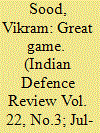

|
|
|
| 15 |
ID:
091371


|
|
|
| 16 |
ID:
193055
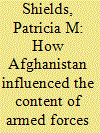

|
|
|
|
|
| Summary/Abstract |
This commentary examines the influence of the Afghanistan war on the content of Armed Forces & Society. My 20-year tenure as editor of Armed Forces & Society overlaps completely with the war. Using the lenses of the postmodern or post-Cold War military, I reflect on how the articles of this journal were influenced by the war. The postmodern military relies more heavily on volunteers, is more likely to engage in unconventional missions, and more likely to use multinational forces. I found an increase in articles devoted to reserve forces and contractors. In addition, many articles investigated the unique management challenges of the International Security Assistance Force (ISAF). The multiple deployments and brutal nature of the war led to a large increase in health/mental health articles and also contributed to changes in the scope of the military family and veterans’ literature. The limited civil–military relations literature was affected indirectly.
|
|
|
|
|
|
|
|
|
|
|
|
|
|
|
|
| 17 |
ID:
101660


|
|
|
| 18 |
ID:
148144


|
|
|
|
|
| Summary/Abstract |
RICHARD H. IMMERMAN assesses the efforts of the U.S. intelligence community in Iraq and Afghanistan following the terrorist attacks of September 11, 2001. He argues that policymakers are primarily culpable for the missteps in the Iraq and Afghanistan wars and that intelligence played a larger role in efforts to terminate the wars than in decisions to engage in them.
|
|
|
|
|
|
|
|
|
|
|
|
|
|
|
|
| 19 |
ID:
124721
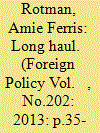

|
|
|
|
|
| Publication |
2013.
|
| Summary/Abstract |
At the sprawling Bush market deep within Afghanistan's capital, the American war is for sale. The maze of some 500 interconnected stores, named for the US president who invaded in 2001, is a chaotic emporium brimming with goods carted in by truck to supply NATO troops. For more than one decade, thousand of vehicles have crossed the border with Pakistan each month, barring food and supplies that are in turn pilfered, repurposed with price tags and put on display under the baking sun: Pop-Tars, Maxwell house coffee canisters and squeeze bottles of maple syrups alongside military fatigues, body armor night vision goggles GPS devices and even some automatic rifles.
|
|
|
|
|
|
|
|
|
|
|
|
|
|
|
|
| 20 |
ID:
173836
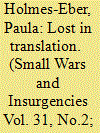

|
|
|
|
|
| Summary/Abstract |
Drawing upon ethnographic data gathered over a six year period, this paper illustrates how the contrasting worldviews of US Marines and anthropologists frequently led to misunderstandings, frustrations, and garbled interpretations as the two struggled to work together to help resolve conflicts in Iraq and Afghanistan. I examine three key military domains where cultural experts and Marines attempted to work together to understand the cultural factors at play in both Iraq and Afghanistan: first as interpreters or experts in pre-deployment language and culture training programs; secondly in theater on the Human Terrain Teams; and third as cultural SMEs (experts) in military planning rooms. As the case studies and interviews illustrate, while both sides thought they were working together to understand the foreign cultures where they were operating, the real cross-cultural misunderstanding was ironically between the cultural experts and Marines.
|
|
|
|
|
|
|
|
|
|
|
|
|
|
|
|
|
|
|
|
|